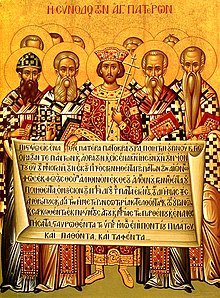Creed
Doctrinal statements may include positions on lectionary and translations of the Bible, particularly in fundamentalist churches of the King James Only movement.Anabaptism, with its origins in the 16th century Radical Reformation, spawned a number of sects and denominations that espouse "No creed, but the Bible/New Testament".They believe that such formal structures, “be they written words, steeple-houses or a clerical hierarchy,” cannot take the place of communal relationships and a shared connection with God.In his book, Sins of the Scripture, Spong wrote that "Jesus seemed to understand that no one can finally fit the holy God into his or her creeds or doctrines."[32] Within the sects of the Latter Day Saint movement, the Articles of Faith are contained in a list which was composed by Joseph Smith as part of an 1842 letter which he sent to "Long" John Wentworth, editor of the Chicago Democrat.It is canonized along with the King James Version of the Bible, the Book of Mormon, the Doctrine & Covenants and the Pearl of Great Price, as a part of the standard works of the Church of Jesus Christ of Latter-day Saints."[39] Still, the opening lines of the prayer Shema Yisrael can be read as a creedal statement of strict monotheism: "Hear O Israel, the Lord is our God, the Lord is One" (Hebrew: שמע ישראל אדני אלהינו אדני אחד; transliterated Shema Yisrael Adonai Eloheinu Adonai Echad).[43] Following a debate that lasted more than twenty years, the National Conference of the American Unitarian Association passed a resolution in 1894 that established the denomination as non-creedal.
Creed (disambiguation)Articles of Faith (disambiguation)Profession of faithEmperor ConstantineFirst Council of NicaeaNiceno-Constantinopolitan CreedbeliefsChristian denominationsApostles' CreedAthanasian CreedʿaqīdahChristianityJesus is LordPaul the ApostleNicene CreedFirst Council of ConstantinopleTrinityorthodoxyArianismwestern Christianitychurch servicesIslamicliturgyincipitLate Middle EnglishSymbolum ApostolorumProtestantHelvetic ConfessionEvangelical Protestantismlectionarytranslations of the BiblefundamentalistKing James Only movementChristNativityBaptismMinistryCrucifixionResurrectionAscensionOld TestamentNew TestamentGospelChurchNew CovenantTheologyFatherHoly SpiritApologeticsChristologyHistory of theologyMissionSalvationUniversalismHistoryTraditionApostlesEarly ChristianityChurch FathersConstantineCouncilsAugustineIgnatiusEast–West SchismCrusadesAquinasReformationLutherDenominations(full list)NiceneCatholicEasternOld CatholicPalmarian CatholicIndependent CatholicSedevacantismEastern OrthodoxOriental OrthodoxChurch of the EastAdventistAnabaptistAnglicanBaptistFree EvangelicalLutheranMethodistMoravian [Hussite]PentecostalPlymouth BrethrenQuakerReformedUnited ProtestantWaldensianNondenominational ChristianityRestorationistChristadelphiansIglesia ni CristoIrvingiansJehovah's WitnessesLatter Day SaintsMembers Church of God InternationalThe Church of Jesus Christ of Latter-day SaintsThe New Church (Swedenborgian)Unitarians and UniversalistsCivilizationCriticismCultureEcumenismGlossaryOther religionsPrayerSermonSymbolismWorshipOutlineEarly ChurchProtestantismEvangelical ChristianityFirst London Baptist ConfessionExcommunicationheretics'apostasyAnabaptismRadical ReformationHutterites